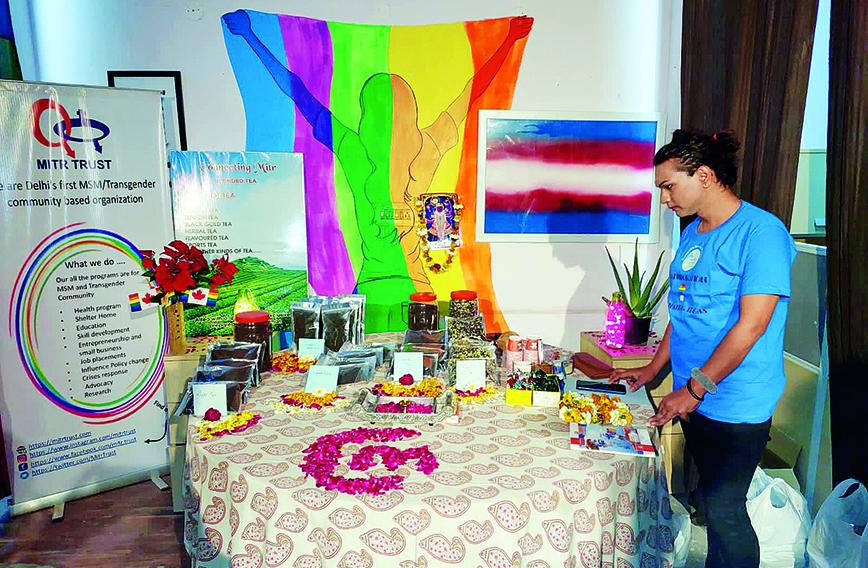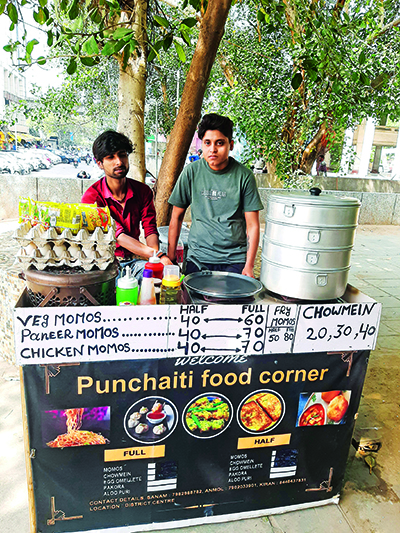
Priyanka with her tea samples
Transgenders try their hand at setting up enterprises
Sarita Brara, New Delhi
TRANSMAN Anmol lost his job as a computer instructor with a private company due to discrimination, he says. Transwoman Sanam, a commerce graduate, got tired of being treated with indignity. Like many young educated transgenders, they decided to team up and start their own venture.
The two first met at Mitr Trust, an NGO founded in 2005, which works for the rights of the transgender community. In collaboration with EY Foundation and Connecting Dreams Foundation, Mitr Trust has started a project named Saksham to help young transpeople complete their education through distance learning and learn skills so that they can start their own ventures. The trust provides seed capital too.
Rules under the Transgender Persons (Protection of Rights) Act, 2019 seek to recognize the identity of transgenders and prohibit discrimination in education, employment, healthcare, holding or disposing of property, holding public or private office, and access to and use of public services and benefits.
The reality is sadly different. The integration of transgender people into society is still only on paper. Young transgenders are therefore trying to stand on their feet by employing themselves and perhaps a few others.
Anmol and Sanam have started a fast-food stall called Punchaiti Food Corner at a business complex in southwest Delhi. They have begun with a modest menu of momos, noodles, butter-toast and omelettes. Connecting Dreams Foundation has helped them buy a moveable stall and implements like an icebox, frying pans and other gadgets.
The two are now trying to get a licence and a better location in the business complex. “We are facing technical problems in getting a licence. Once that is sorted out, we will add a few more items to our menu to enable us to earn more money,” says Anmol. Currently, they earn around `1,000 a day. “It’s not only in offices that we face discrimination. Even here, we come across untoward behaviour at times but we ignore it and refuse to be provoked. We are determined to continue with our venture and get more customers,” says Sanam.
Sanam’s mother has allowed them to stay in her house but remains indifferent to them. Anmol’s parents, who live in Uttar Pradesh, are in denial of his transgender status.
Another transwoman, Priyanka from Assam, has started a business in blending tea leaves with different flavours. ‘Connecting Mitre’ is the brand name she has given her venture. “My brand is natural and organic. The flavour used is labelled on the packaging,” she says. She spent nine years in tea gardens close to her home in Jorhat to learn the process of growing tea leaves and blending teas.
 |
| Sanam and Anmol |
“It is not possible for me to start any venture in my home town where even my own parents are in denial of my sexuality,” says Priyanka.
Priyanka stayed for a year at Garima Greh in Delhi, a shelter for transgenders with basic amenities, set up by the Ministry for Social Justice and Empowerment’s SMILE or Scheme of Support for Marginalized Individuals for Livelihood and Enterprise. SMILE, launched in 2019, also provides support to transgender people for skill-building courses.
Priyanka opted for an English-speaking course. Connecting Dream Foundation mentored her in packaging, branding and marketing her tea leaves and provided her with finance to start her business.
She has decided to sell her tea blends to retailers until she can afford a space of her own. “It is going to be challenging. But I am hopeful because my tea blends were liked by customers at a few events where I introduced my brand.” The price of her flavoured organic tea ranges from `70 to `110 for a 250-gm box.
Transwoman Bela, the first to seek shelter at Garima Greh, is now the programme manager of the scheme. She sends money to her parents. But she doesn’t live with them because she doesn’t want her younger sisters to suffer because of her trans status. Bela earns extra money working as a model. She eventually wants to open her own production house.
Mitr Trust is currently helping 25 transgender people benefit from SMILE’s Garima Greh project. “Our objective is to see that transgender persons live a life of dignity and are not forced to beg on the streets,” says Rudrani Chhetri, founder of the trust.
The government provides stay and food only for a year. Chhetri says this is too short a time. “It takes months for transgenders who seek shelter in Garima Greh to emerge from the trauma and harassment they have faced for years at their homes and elsewhere. Most of them are school or college dropouts and so they need to first complete their education and we then train them in skill-based work,” says Chhetri.
Mitr Trust has also been able to get placements for 58 transgender persons with companies and MNCs in Delhi and elsewhere. One of them is Rifaya, also from Assam. Trained in nail art, she found her freelancing assignments didn’t pay enough. She recently got a job with Amazon in their customer care wing. Rifaya wants to start her own salon and has applied for financial help to NGOs.
Indrakshi, another transwoman, also recently got a job with Amazon. Born male, Indrakshi, who always had feminine interests, learnt later that she was a transwoman. She did not want to continue to dress and live like a man. Skilled in dance, Indrakshi left her home in West Bengal after Class 9 to live with her sister in Gurugram. She worked as an anchor in theatre and did odd jobs in private companies to avoid being financially dependent on her family. She wanted to be a radio jockey, and tried her hand in filmmaking but lost her savings chasing this dream.
“I realised that my interests and hobbies wouldn’t earn me any status in society. I want to graduate in commerce and study up to post-graduate level and then get a job. It was through social media I came to know that I was not the only one who felt like a woman and wanted to dress and act like one. I was still confused about my status,” she says. She came to Mitr Trust in 2018 and went through a lot of counselling. Indrakshi is now undergoing hormone therapy for transition.
The National Institute for Social Defence, which holds workshops on the rights of transgender people and sensitising society, has a number of transgender persons on its pay rolls. Pride Circle also organizes job fairs annually for the LGBT+ community with many companies taking part. In the past four years, they have been able to find employment for 600 persons from the LGBT community.
Government schemes and non-profits are reaching out to transgender people but social awareness lags behind miserably.
The writer is a senior independent development journalist. Share your feedback on charkha@connect.org Charkha Features
Comments
-

evita fernandez - June 9, 2023, 4:04 p.m.
thank you for this article. It certainly gave me hope when I read about Mitr trust and SMIlE. Individuals in this unique world suffer a lot and social discrimination is only one aspect. It is time we accept transgenders into our world and accept them unconditionally. A hard one for some of us but doable and must be done.




